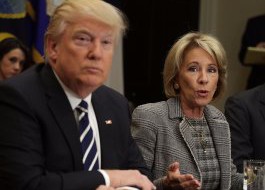
Stanley McChrystal, a retired army general, urged leaders in Washington and the Trump administration not to strip federal funding for public broadcasting in a New York Times op-ed, saying that it makes the nation "smarter, stronger and, yes, safer."
McChrystal was referring to President Trump's draft budget proposal, which included a suggestion to eliminate all $455 million – about $1.35 per person – that's currently dedicated to public and educational programming.
Prior to his retirement, McChrystal was a 34-year combat veteran who former defense secretary Robert Gates described as "perhaps the finest warrior and leader of men in combat I ever met."
McChrystal tendered his resignation in 2010 after he was quoted mocking then-Vice President Joe Biden and other government officials in a Rolling Stone article.
McChrystal acknowledged that his stance on this topic may be "unlikely," but that his experience taught him "that education, trusted institutions and civil discourse are the lifeblood of a great nation," and that soldiers thrive "when they are both strong and smart."
The former general also highlighted his belief that public broadcasting and "thoughtful" television and other media is essential for families in which parents are busy working and don't always have the time to devote to their children's' education and preparation for school.
He pointed to a study by the Annie E. Casey Foundation, which found that between 2011 and 2013, more than half the kids in this country didn't have the chance to enroll in a preschool program. Having access to free public broadcast channels like PBS is critical, McChrystal argues, for families who may have fewer opportunities and lower income. PBS Kids is currently the only free educational programming channel that airs all day.
 Sesame Street
Sesame Street
Adding that debating between funding public broadcasting programs and strengthening the military was a "false choice," McChrystal said that free educational programming teaches children the skills and character traits necessary for success in school, as well as the military.
McChrystal also seemed to allude to public sentiment in the country, saying that "Trust among Americans and for many of our institutions is at its lowest levels in generations, and stereotyping and prejudice have become substitutes for knowing and understanding one another as individuals."
He added that while the question of how to restore trust between citizens and the government was an "existential" one, "it's ultimately a practical one," and that elected officials should be practical when approaching the issue, instead of falling back on partisanship.
National public broadcasting functions as "our largest classroom," he said. "We need a strong civil society where the connection between different people ... is firm and vibrant, not brittle and divided. We need to defend against weaknesses within and enemies without, using the tools of civil society and hard power. We don't have to pick one over the other."
Other agencies that would see drastic cuts under Trump's budget proposal include: the Department of Housing and Urban Development, the Department of Health and Human Services, the Environmental Protection Agency, and Meals on Wheels, which currently provides food for 2 million senior citizens.




